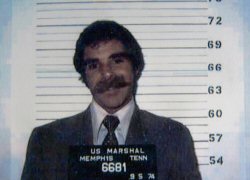
Harry Reems lays it on the table
Interview Date: 08/31/2005
Run Date: 09/12/2005
Interviews Home / Entertainment Channel / Bullz-Eye Home
ALSO: Click here to read Will's review of "Inside Deep Throat."
He was born Herbert Streicher in Manhattan, but those who know their porn will be more familiar with him by his most famous stage name: Harry Reems. Nowadays, the former star of “Deep Throat,” as well as “Sherlick Holmes,” “Erotic Doctor Jekyll,” and “For Your Thighs Only,” is, if you can believe it, just another guy in his late 50s, someone who could be your next-door neighbor. Long since retired from the adult film industry, Reems broke a two-decade media silence to appear in “Inside Deep Throat,” the documentary about his most famous film that’s now coming to DVD. Reems spoke with Bullz-Eye about “Deep Throat,” the repercussions it had on his life and career – including a lengthy court case surrounding the film’s supposed obscenity – and what his life is like now.
Harry Reems: Hi, Will, Harry Reems here!
Bullz-Eye: Hey, Harry, how ya doin’?
HR: Pretty good; how ‘bout yourself?
BE: Not too bad at all.
BE: So where are you right now? Home, in Utah?
HR: No, I’m at Universal Studios. Yeah, they flew me in for the day. We had a little bit of press, a nice lunch, and I’ll leave later this afternoon.
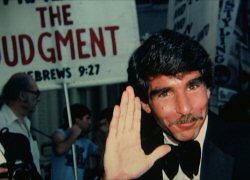 BE: Excellent. So how does it feel to be respectable now for having been,
uh, unrespectable?
BE: Excellent. So how does it feel to be respectable now for having been,
uh, unrespectable?
HR: (laughs) I don’t know if that’s the way to put it, but my life’s a lot different from when I was making those movies 30 years ago. Today, I’m happily married, I’ve converted to Christianity, and I’ve got a very successful and prosperous real estate business in Park City, Utah. Obviously, it’s a big change and a big difference, but I’ve kept pretty much private, Will, over these last 20 or so years, since – 1985, I think, was the last time I really did press – until I met the two producers of the movie, “Inside Deep Throat,” Randy (Barbato) and Fenton (Bailey), who very persuasively convinced me that this was not going to be a documentary about sex and drugs and rock and roll. Plus, I looked up their credits, I watched a piece or two that they had done, and very gladly participated in it, because it gave me an opportunity to talk about some of the other things that I would rather talk about these days, and that would be recovery from drugs and alcohol.
BE: The way the film portrays it, the, uh, downhill tumble, as it were, kinda started after the “Grease” incident. (Reems was poised to make his mainstream breakthrough as Coach Calhoun, a role that would eventually go to Sid Caesar.) Or, at least, that’s how it sounded, anyway.
HR: Yeah, when Paramount bounced me out of that production and paid off the contract. And they gave me a very credible reason why, and I probably would’ve done the same thing. They were losing play dates in certain, more conservative communities, and, obviously, the point of a film is to get as many play dates as possible. Well, it very clearly indicated to me that a transition into a more, uh, conventional form of entertainment was not gonna happen. And much like an athlete – that’s what I’ll draw as an analogy – an athlete whose career winds up in his mid 30s, and I had not planned ahead or thought about what I would do in the future, because I was always hopeful that I could continue acting. But that didn’t come about. So, being the very weak person I am, I ran toward drugs and alcohol until it became a huge problem and nearly killed me.
BE: Now, when you ended up with the lead role in “Deep Throat,” it was totally by happenstance, basically.
HR: Very much so! I was hired as a lighting director on “Deep Throat.” I had been making these movies as an actor since 1967, early ’68, and, after three or four years of it, I was getting rather tired and (laughs) bored, believe it or not, of performing in those films, and I really got interested in the craft of making films. So I had worked on a number of productions behind the camera and was hired as the lighting director on “Deep Throat,” and the actor...I can’t remember whether he didn’t show up or when he did show up, he could perform or couldn’t act. But I had worked for the director, Gerry Damiano, in several other films that he’d directed early, and he put the white coat on me and said, “Go have fun with it!”
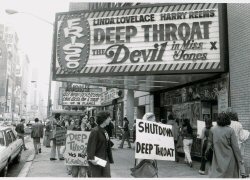 BE: And the rest is history, as they say.
BE: And the rest is history, as they say.
HR: And the rest is history!
BE: I know you did at least... (pauses) Uh, how many more films did you do after “Deep Throat”?
HR: Oh, I would say after “Deep Throat” is when I really did...well, I can’t really say that. I’d say I probably participated as an actor in at least 300, 400 films...probably half before and half after. But, after “Deep Throat,” interestingly enough, I was flown to Paris, France, to shoot the softcore French version of “Deep Throat!” (laughs) They hired a girl who looked exactly like Linda Lovelace from behind, they wrote a whole new story! I mean, the French version of “Deep Throat” is nothing like the American version, or the English version of “Deep Throat” – a whole different movie! – but while I was there, I met with an agent who started to get me some work in some German police shoot-‘em-up films and Italian spaghetti westerns, and I spent a good deal of time in Europe between late ’72 and ‘til about 1976, when the trial really kinda took over my life. So I would say that I probably did a couple of hundred films before “Deep Throat,” and a couple of hundred films after.
BE: I was looking on the Internet Movie Database, which I know isn’t always 100% accurate, but they only had about 130 films listed for you....
HR: Yeah, I know, but, ironically, they had movies there that I supposedly did in 1990, 1991, 1992. The last adult film I did was in 1985. In 1982, I very reluctantly went back into the business. It was after the “Grease” incident, and I was paid very handsomely for one film, because I hadn’t been on the screen in an adult film in several years before the court trial. I did a film – I think it was called “High Society” (Writer’s note: it was actually called “Society Affairs”) – but I was paid six figures and a percentage of the gross, and, after that film came out, I continued to do more adult films until about 1985, but I was not happy. And I turned to drugs and alcohol and became a very depressed person. Actually, it came to a point where I wasn’t even insurable in a motion picture, so I sort of sabotaged my own career.
BE: In the film, it indicates that you eventually reached a point where you were essentially panhandling, but at what point did you officially realize, “I’ve got to do something about this, or there’ll be no more ‘me’ at all?”
HR: Well, there was a lot of denial, obviously. I started drinking during that trial. I hadn’t really drank much before that. But, during the trial, I’d stop at a liquor store, pick up a bottle of wine, and drink it to forget the day’s follies in the courtroom, and that went on night after night for 12 weeks. Then I went back and did the movie in ’82 and continued to drink. But I was in denial that I had a drinking problem and continued to drink – to the tune of a half a gallon a day! – from 1985 ‘til July of 1989. At that point in time, I realized that I either gotta kill myself or I gotta get better. Fortunately, I chose to get better, and I found the rooms of a 12-step anonymous program, and, now, I’m 16 and a half years clean and sober and as happy as I could ever want to be. In fact, my life today is better than anything I could’ve thought it would be when I was younger.
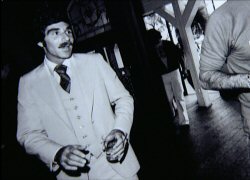 BE: Congratulations.
BE: Congratulations.
HR: Thank you!
BE: How did you come to live in Utah?
HR: When I was living in L.A., during that whole “Grease” era...I moved to L.A. in 1976, right after the trial; we were trying to do some legal defense funds and get a lot of press and turn the public’s attention to the travesty that was going on in Memphis, Tennessee, and I moved to L.A. then. (pauses, then laughs) Forgive me, I forgot the question!
BE: (laughs) How did you come to move to Utah?
HR: Oh! Well, living in L.A., I met up with a lot of folks – some of them were film people, some with the studios, some with the television industry – and we decided to all go learn how to ski. So a bunch of us went to Park City, Utah, in the mid-‘70s, and learned to ski, and one of them decided to build a house. So every year, we’d go out to ski. The first year was one week, the second year was two weeks, and it wasn’t long before we were spending our entire winters in Park City, and we went back one summer to see the progress on the house that was being built for one of my friends, and I just fell in love with the place in the summertime and swore that, someday, I’d go and live there. Well, unbeknownst to me, I woke up there in 1987 – I don’t remember getting there – and I stayed drunk for the next two years before I started to get better. But Park City’s been home ever since, and I love the place. I’ve been all over the world, and my wife and I have been looking for a retirement community to live in, and we haven’t found anything that compares to Park City, Utah.
BE: To jump back to the trial, were you just totally blindsided that they decided to go after you in particular?
HR: Oh, very much so. When I was first arrested in ’72 – the trial started in ’74 – I just assumed I was one of many people involved in the production that was arrested. It turned out I was the only one. Linda Lovelace and the director / producer, Gerry Damiano, were given immunity...and were witnesses for the prosecution! Linda Lovelace just stood there, pointed, and said, “Yeah, that’s the actor I did the sex with in the movie,” and the director stood up and said, “Yeah, that’s the actor I directed to have sex in the movie.” The other defendants, I later learned, were nine members of the Columbo (crime) family.
BE: Geez. It doesn’t exactly put you in great company.
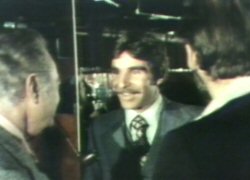 HR: (forlornly) No...no. And I had no idea. I mean, I had met them,
because I’d done films for that company before with Gerry Damiano, and I had no
idea, other than they were just kind of rough people, and, well, the people in
the industry back in the late ‘60s and early ‘70s were rough to begin with! But
I was an innocent; I had no idea it was organized crime or that organized crime
was even in the industry until those trials. Then, I learned some of the things
they did during the distribution of the film: cars being found with a lot of
blood and two fingers in them and no body ever recovered, projectionists beat
over the head with baseball bats, a lot of money flying to the Bahamas without
having to pay any taxes on it. I sat for nine weeks and just kept hearing all
this testimony and seeing all this evidence about all this brutality connected
with the distribution and felt very, very alone. By the end of the trial, I was
sitting so far down the bench on the defense table that I was almost in the
galleys, trying to separate myself from them.
HR: (forlornly) No...no. And I had no idea. I mean, I had met them,
because I’d done films for that company before with Gerry Damiano, and I had no
idea, other than they were just kind of rough people, and, well, the people in
the industry back in the late ‘60s and early ‘70s were rough to begin with! But
I was an innocent; I had no idea it was organized crime or that organized crime
was even in the industry until those trials. Then, I learned some of the things
they did during the distribution of the film: cars being found with a lot of
blood and two fingers in them and no body ever recovered, projectionists beat
over the head with baseball bats, a lot of money flying to the Bahamas without
having to pay any taxes on it. I sat for nine weeks and just kept hearing all
this testimony and seeing all this evidence about all this brutality connected
with the distribution and felt very, very alone. By the end of the trial, I was
sitting so far down the bench on the defense table that I was almost in the
galleys, trying to separate myself from them.
BE: I read that Warren Beatty threw you a fund raiser to help with your legal defense fund.
HR: Actually, Warren Beatty and Jack Nicholson came to Memphis, Tennessee, to testify in my trial! The judge would not let them take the stand. He said that whatever they had to say was not relevant. And after the trial was over, I was bankrupted and needed more funds, and so we started the Harry Reems Legal Defense Fund back in the mid-‘70s to raise money to pay for all the transcripts, to pay for all the attorneys. Yeah, I had celebrities host numerous fundraisers all around the country.
BE: Are you still in contact with any of them now?
HR: No, they weren’t my friends; I hadn’t met many of them. They were there because of the issue that was being threatened, and that was creative freedom. They weren’t there supporting Harry Reems; they were supporting an issue. I had no pretense that they were there for anything other than that. I thanked them, and I’m very grateful to all of them to this day, but, no, I haven’t really remained...well, we never really did have a friendship; we had an acquaintance. The only person that I ever really developed a friendship with – and still stay in touch with – is Hugh Hefner, and I haven’t seen him in some years, but we write every year and we talk a couple of times a year on the phone. But I’m married now, I live in Park City, Utah, and I don’t get to travel as freely as the old days.
BE: Did you have any contact with Linda Lovelace after the trial, any mending of fences?
HR: No, after being extradited to Memphis, Tennessee, and held in jail over a long weekend, I was given a copy of the indictment, and I saw the number of unindicted co-conspirators, because this was a conspiracy to transport into state obscene material. It flew over the state of Tennessee; it never played in Tennessee. It was forum-shopped into Memphis. But I got a chance to read the indictment, and there were 100 or 200 unindicted co-conspirators including American Airlines, Greyhound Buses...all of these people supposedly violated the law when they moved the film around! Well, Linda Lovelace and Gerry Damiano were also named as unindicted co-conspirators. I did not find out they were going to be witnesses against me until the trial had already began. No, I really hadn’t been in contact with Linda or Gerry for some years prior to the trial. The only opportunity I had to briefly make contact with Linda Lovelace was vicariously through a friend of hers, who called me up to tell me that she needed some money; she needed a liver transplant and couldn’t afford it. So I sent a thousand dollars to her...and never heard back, never got a thank-you. And I understand that she took her clothes off and did some more nude, sexy posing for magazines or films...I don’t know what for.
BE: Yeah, I saw that in the film.
HR: She was a real favorite of the women’s movement with her book, “Ordeal,” saying that she’d been forced at gunpoint to make this movie – well, none of that was true – until she fell out of favor with the women’s movement, and then, suddenly, came back and did more porno, or did more nudity or sex scenes or whatever it was she did. So there was some hypocrisy there in that character. But, no, after the movie was over, we never saw each other again...except in the courtroom.
BE: So, the Harry Reems Athletic Club...I thought that was hysterical.
HR: (laughs) Now, where’d you hear about that? Oh, it’s in the movie!
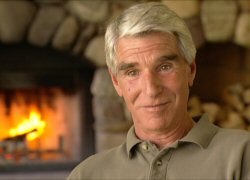 BE: Well, actually, it’s in the special features on the DVD.
BE: Well, actually, it’s in the special features on the DVD.
HR: Actually, I didn’t even know it existed! I got a call about five years ago from a woman in Florida, saying, “My husband is the president and founder of the Harry Reems Athletic Club, it’s his 60th birthday, and would you please send me a photograph?” Well, I did, I sent her a photograph, then I got a thank-you from the husband. The next year, he was on a motorcycle trip and stopped through Park City with a bunch of his friends and took myself and my wife out to lunch. They did it again this year. It seems that the Harry Reems Athletic Club is worldwide, with over 44,000 members, and I’d never heard of it!
BE: Now, see, I’m going to have to look into membership.
HR: (laughs) You’d better get a membership card. I think they hand them out readily.
BE: Have you ever pondered the possibility that you could be another Ron Jeremy? I mean, I know it’s so far behind you now, but do you ever see Ron and his almost gratuitous cameos in anything vaguely sexy, and...
HR: (dismissively) No, I have no interest in anything like that. I’m a very private person today. I know Ron Jeremy – I haven’t seen him or talked to him in 20 years – and I guess he’s an exhibitionist. He’s certainly ubiquitous. He’s all over the place. But I have no interest in being that kind of person.
BE: I guess my last question is that, although there’s obviously no way you could’ve imagined what kind of sensation “Deep Throat” would’ve become when you were filming it, but did you at least suspect it was going to be something unique?
HR: No, making the movie, the only thing I knew that was different was that, previously, after “I Am Curious (Yellow)” came through the United States, challenging the existing obscenity laws of the time, and it was found not to be obscene, the American filmmakers started to make what we used to call “white coaters.” There would always be a doctor in a white coat, saying, “If you’re having trouble with oral sex, here’s how you do it,” and they’d cut to a 30-minute oral sex scene, of course. And I wore that white coat many times. But “Deep Throat” was uniquely different in that it did not have any pretense of having that social redeeming value, that educational value. In fact, it was a spoof of those movies. And I even said to Damiano at the time, “Are you sure you know what you’re doing here? Are you sure you’re not breaking the law? You’re not giving the film the social redeeming value it needs to stay out of the courtrooms!” And he said, “Oh, I know what I’m doing.” I never thought I’d be involved in a court case, but that’s how it worked out. He was the witness, and I was the defendant.
BE: Well, I think that pretty well wraps it up for me, then.
HR: Alright, Will, it’s been great talking to you...and I’ll keep an eye on Bullz-Eye!
You can follow us on Twitter and Facebook for content updates. Also, sign up for our email list for weekly updates and check us out on Google+ as well.









